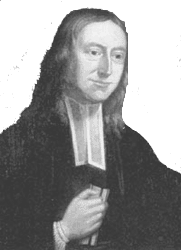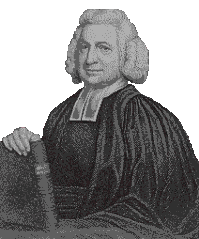John and Charles Wesley
 Today, in the Episcopal calendar of saints, we remember John and Charles Wesley, brothers whose ministry included time surving in our own Diocese of Georgia. While the movement they started within the Church of England may have grown into a separate denomination, the two remained Anglicans their whole lives (even if taking actions that made the division likely). The movement they started became known as Methodists when there were still but a handful in the group. At Oxford College they were given this name as a term of derision from a student who, according to John, did so "in allusion to the ancient sect of Physicians so called, from their teaching, that almost all diseases might be cured by a specific method of diet and exercise, or from their observing a more regular method of study and behaviour than was usual with those of their age and station."
Today, in the Episcopal calendar of saints, we remember John and Charles Wesley, brothers whose ministry included time surving in our own Diocese of Georgia. While the movement they started within the Church of England may have grown into a separate denomination, the two remained Anglicans their whole lives (even if taking actions that made the division likely). The movement they started became known as Methodists when there were still but a handful in the group. At Oxford College they were given this name as a term of derision from a student who, according to John, did so "in allusion to the ancient sect of Physicians so called, from their teaching, that almost all diseases might be cured by a specific method of diet and exercise, or from their observing a more regular method of study and behaviour than was usual with those of their age and station." Their Method of being strict in observing the worship of the Book of Common Prayer took off and in time became a thriving denomination of its own. When it was still a movement within the Anglican Church, John Wesley wrote out The Character of a Methodist spelling out what a Methodist was not saying
Their Method of being strict in observing the worship of the Book of Common Prayer took off and in time became a thriving denomination of its own. When it was still a movement within the Anglican Church, John Wesley wrote out The Character of a Methodist spelling out what a Methodist was not sayingTHE distinguishing marks of a Methodist are not his opinions of any sort. His assenting to this or that scheme of religion, his embracing any particular set of notions, his espousing the judgment of one man or of another, are all quite wide of the point. Whosoever, therefore, imagines that a Methodist is a man of such or such an opinion, is grossly ignorant of the whole affair; he mistakes the truth totally.Instead of those sorts of distinguishing marks of doctrine, John wrote that a Methodist is determined by their faith alone. He wrote,
"What then is the mark? Who is a Methodist, according to your own account?" I answer: A Methodist is one who has "the love of God shed abroad in his heart by the Holy Ghost given unto him;" one who "loves the Lord his God with all his heart, and with all his soul, and with all his mind, and with all his strength. God is the joy of his heart, and the desire of his soul; which is constantly crying out, "Whom have I in heaven but thee? and there is none upon earth that I desire beside thee! My God and my all! Thou art the strength of my heart, and my portion for ever!"That being the case, I would like to be a Methodist myself, though I prefer to do so within the Episcopal Church. While not for all Christians, it is where I can most truly live into and nurture that "love of God shed abroad in my heart" with the liturgy that nurtured the Wesleys. But I give thanks today for the millions of Methodists (in denomination as well as Method) and the ongoing impact that two priests who briefly served in our diocese continue to have on the world.
peace,
Frank+
The Rev. Frank Logue, Pastor + King of Peace Episcopal Church







1 Comments:
At 3/03/2006 2:55 PM, Anonymous said…
Anonymous said…
THIS MADE ME GO AND LOOK UP SOME NOTES THAT I HAD TAKEN ON SOME OUR WONDERFUL HYMNS. AFTER SOME DIGGING, THIS IS WHAT I HAD JOTTED DOWN: CHARLES WESLEY WROTE OVER 6,500 HYMNS (COULD THIS BE CORRECT?) AMONG THEM, "O, FOR A THOUSAND TONGUES TO SING", "HARK, THE HERALD ANGELS SING". JOHN WESLEY TRAVELLED OVER 250,000 MILES IN THE CAUSE OF THE GOSPEL. HE AND HIS BROTHER CHARLES, WENT TO SAVANNAH TO WORK AS MISSIONARIES TO THE INDIANS. ON THE SHIP GOING TO GEORGIA, THEY MET SOME MORAVIANS AND WERE IMPRESSED BY THEIR SPIRITUAL STRENGTH AND JOY IN THE LORD. ("O, FOR A THOUSAND TONGUES TO SING" WAS INSPIRED BY THEM.) Thanks for the writing about the Wesley brothers. There is a very well written piece about Charles Wesley on the wikipedia website that your readers may enjoy. Peace.
Post a Comment
<< Home